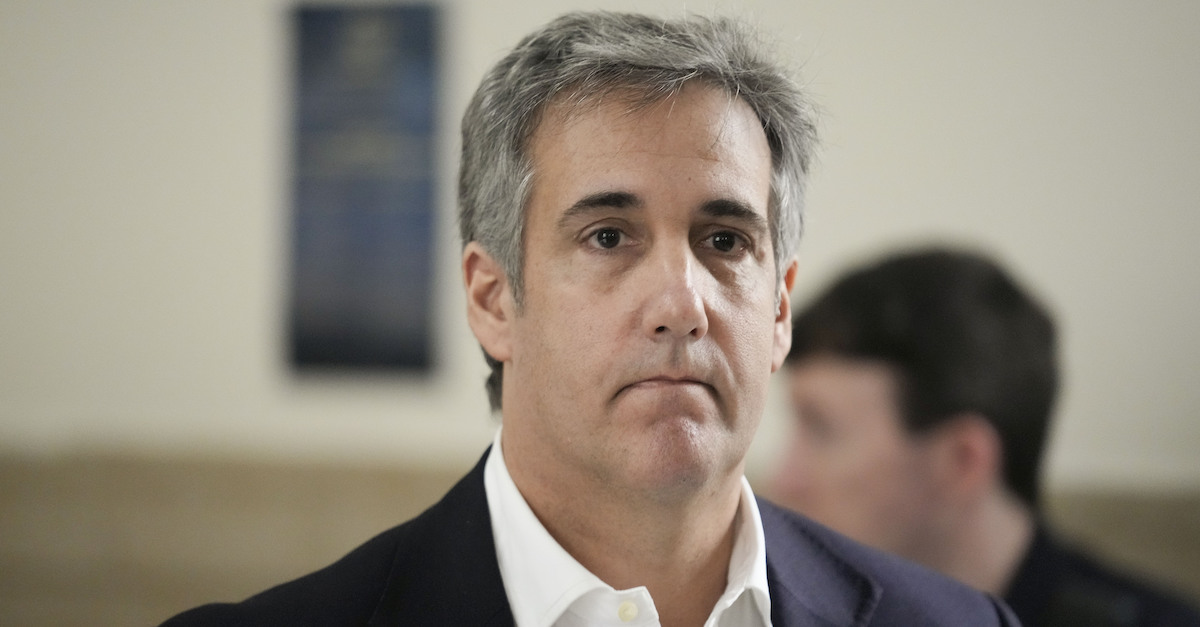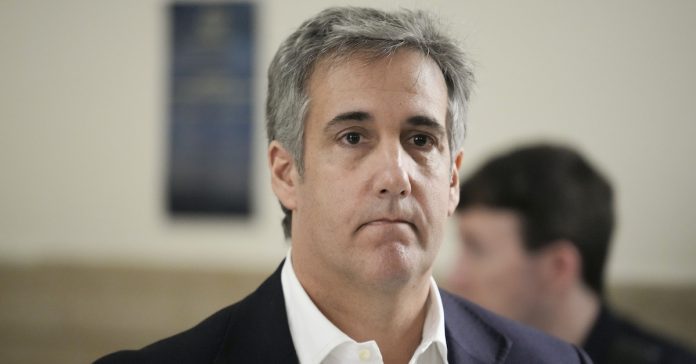
Michael Cohen returns to the courtroom after a break in proceedings on Oct. 25, 2023, in his ex-boss Donald Trump’s New York civil trial. (AP Photo/Seth Wenig)
A federal judge on Wednesday turned down Michael Cohen’s bid to end his supervised release early, remarking that it was “perverse” of the defense to try and “spin” an admission that he lied under oath into a reason he was entitled to relief from the rest of his sentence.
U.S. District Judge Jesse Furman, noting that Donald Trump’s former fixer has tried time and again to terminate his supervised release, was not at all persuaded by the “principal basis” of Cohen’s latest request. While Cohen cited his October 2023 testimony in Trump’s New York civil fraud trial, in which he admitted having lied under oath to his sentencing judge, Furman agreed with the government that, if anything, the testimony only supported denying the request.
“Specifically, Cohen repeatedly and unambiguously testified at the state court trial that he was not guilty of tax evasion and that he had lied under oath to Judge Pauley when he pleaded guilty to those crimes,” Furman said, before quoting a sampling of Cohen’s admissions.
The judge then stated it was “perverse” of Cohen’s attorney David Schwartz to use the Trump trial testimony “as evidence of Cohen’s ‘commitment to upholding the law.””
“It gives rise to two possibilities: one, Cohen committed perjury when he pleaded guilty before Judge Pauley or, two, Cohen committed perjury in his October 2023 testimony. Either way, it is perverse to cite the testimony, as Schwartz did, as evidence of Cohen’s ‘commitment to upholding the law.’ And either way, it would undermine, rather than serve, the purposes of sentencing incorporated by reference in Section 3583(e), including deterrence, rehabilitation, or proportionality, to terminate Cohen’s supervised release before its natural expiration in November of this year,” Furman concluded. “At a minimum, Cohen’s ongoing and escalating efforts to walk away from his prior acceptance of responsibility for his crimes are manifest evidence of the ongoing need for specific deterrence.”
Though this would not be the last time the judge sharply criticized Schwartz, he also wrote that Cohen’s defense attorney E. Danya Perry attempted to “turn a sow’s ear into a silk purse” by arguing her client was merely griping about a prosecutorial abuse in his testimony.
“Cohen’s testimony was not, as Perry contends, a ‘clumsy’ or ‘poorly worded’ attempt to argue that, while he committed the crimes to which he pleaded guilty, the Government abused its prosecutorial discretion in charging those crimes. To the contrary,” Furman said, “he unambiguously testified that he ‘didn’t’ commit tax evasion and that he ‘lied’ to Judge Pauley when he said that he had.”
The judge refused to allow Cohen to “shorten his sentence” on that basis, since the testimony did not show the “exceptional level of remorse and a commitment to upholding the law” required.
Trump lawyers have repeatedly bashed Cohen’s credibility as a witness in the Manhattan DA’s hush-money prosecution, but efforts to bar his testimony on those grounds have so far failed. Furman’s opinion and order may be another arrow in their quiver.
The latest failed attempt on the supervised release issue was already marred by a Google Bard fiasco, where the defense cited three cases in support of their arguments — citations that existed only in the Chat GPT-esque artificial mind that invented them as Michael Cohen researched case law.
Furman called the whole episode “embarrassing” and “unfortunate” but not something that warranted sanctions, even as he assigned blame to attorney Schwartz for the “certainly negligent” and “perhaps even grossly negligent” inclusion of fake citations in a motion.
“[T]he Court cannot find that it was done in bad faith. Given Perry’s comments on the initial draft (as conveyed by Cohen), Schwartz understandably believed that the cases had come from her. As Schwartz himself concedes, it was plainly his responsibility to review the citations before putting them in a submission to the Court. But the Court credits his explanation for his failure to do so: that he had confidence in the accuracy of the cases given Perry[s reputation and that he never contemplated that the cases were non-existent.”
In response, attorney Perry called the ruling a “win.”
“While Judge Furman delivered an important win for Michael, we take exception to one aspect Judge Furman’s decision as it relates to Mr. Cohen’s previous testimony. That characterization, although not a judicial determination, is both factually inaccurate and legally incorrect,” Perry said. “Judge Furman did not have a front seat to the testimony at the lengthy trial before Judge Engoron, who emphatically declared that ‘Michael Cohen told the truth.’”
Perry reiterated the defense position that Cohen’s testimony only showed that he pleaded guilty under “severe pressure” from prosecutors.
“And Judge Furman ignores that Mr. Cohen has never disputed the underlying facts of his conduct, and also what many of Judge Furman’s own colleagues on the bench have long noted: that defendants often feel compelled to agree to coercive plea deals under severe pressure,” she continued. “That is exactly what happened to Mr. Cohen.”
Read the ruling here.
Have a tip we should know? [email protected]

